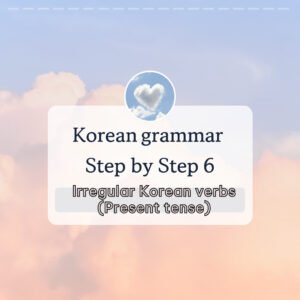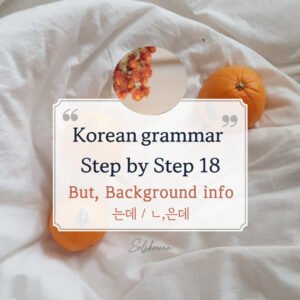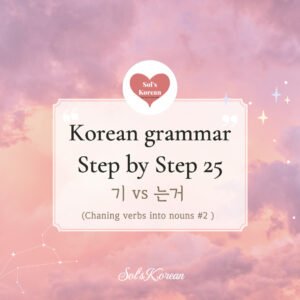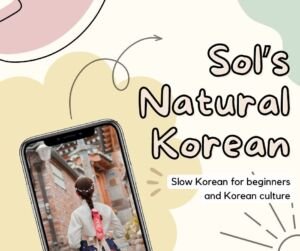Hello everyone! Today, let’s learn how to say sentences like “I have to go” and “I don’t need to study” in Korean! One of the essential grammar points that Korean learners encounter early on is expressing necessity or obligation.
The Korean construction for this is “(아/어/해)야 되다”. It might look complicated, but it’s not too hard!
In this blog post, we will delve into the nuances of this grammar structure, provide lots of examples, and create sentences together! I’ll help you master its use in everyday conversation.
Let’s dive in!
Part 1,
Let’s grasp the concept of grammar
– (아/어/해)야 되다/하다: have to, must, should, need to
Original form: – 야 되다
Most common formality: – 야 돼요 (fairly formal)
Extremely formal: – 야 됩니다
Informal: -야 돼
How to Form “-(어/아/해) – 야 되다”
So, first we have to conjugate the verb to the present tense.
ex) 공부하다 -> 공부해요
Then, we will drop the ending “요” part and put “야 돼요”
공부해야 돼요.
가르치다(to teach) -> 가르쳐요(present tense)
Then, we drop “요” and add “야 돼요”
가르쳐야 돼요.
만나다(to teach) -> 만나요(present tense)
Then, we drop “요” and add “야 돼요”
만나야 돼요.
자다(to sleep) -> 자요(present tense)
Then, we drop “요” and add “야 돼요”
자야 돼요.
듣다(to hear) -> 들어요(present tense)
Then, we drop “요” and add “야 돼요”
들어야 돼요.
You can replace “돼요” with “해요.” Both are commonly used.
공부해야 돼요(have to study) = 공부해야 해요
가르쳐야 돼요.(have to teach) = 가르쳐야 해요.
만나야 돼요.(have to meet) = 만나야 해요.
자야 돼요.(have to sleep) = 자야 해요.
들어야 돼요.(have to listen) = 들어야 해요.
In Korean, expressions of obligation such as “have to,” “must,” “should,” and “need to” are often conveyed with 해야 돼요.
While these obligations may vary in nuance in English, Korean typically uses 해야 돼요 for all.
The best way to become accustomed to this grammar is through numerous examples and exposure in real-life contexts.
Don’t worry! We’ll practice together.
Once, one of my students asked me about the phrase “You should go see a doctor,” which suggests concern rather than obligation. In this case, there are alternative conjugations we’ll explore in the future.
<More examples>
Let’s try conjugating together. Try it on your own first!
(1) 씻다(to wash)
(2) 걷다(to walk)
(3) 저축하다(to save(money))
(4) 낫다(to get better)
(5) 모으다(to collect)
(6) 돌봐주다(to take care of)
(7) 물어보다(to ask)
(8) 대답하다(to answer)
(9) 쓰다(to write, use, wear)
(10) 기다리다(to wait)
Let’s check the answers together!
(1) 씻다(to wash) : 씻어야 돼요.
* 씻다 -> 씻어요 -> 씻어야 돼요/해요.
– 매일 하루에 한 번 씻어야 돼요.
(You should wash up once a day.)
(2) 걷다(to walk) : 걸어야 돼요.
* 걷다 -> 걸어요 (ㄷ irregular) -> 걸어야 돼요/해요.
* If you’re not familiar with ㄷ irregular verbs, check them out here!
– 다이어트하고 있어요. 많이 걸어야 돼요.
(I’m on a diet. I need to walk a lot.)
(3) 저축하다(to save(money)) : 저축해야 돼요.
* 저축하다 -> 저축해요 -> 저축해야 돼요/해요.
– 매달 저축(을) 해야 돼요. 미래가 걱정돼요.
(I have to save money every month. I worry about the future.)
(4) 낫다(to get better) : 나아야 돼요.
* 낫다 -> 나아요 ( ㅅ irregular ) -> 나야 돼요/해요.
* If you’re not familiar with ㅅ irregular verbs, check them out here!
– 감기에 걸렸어요! 빨리 나아야 돼요.
(I caught a cold! I need to get better quickly.)
(5) 모으다(to collect) : 모아야 돼요.
*모으다 -> 모아요 ( ㅡ irregular ) -> 모아야 돼요/해요.
* If you’re not familiar with ‘ㅡ’ irregular verbs, check them out here!
– 이번년에 돈을 많이 모아야 해요.
(I need to save a lot of money this year.)
* 돈(을) 모으다 is the same as 저축하다! Additionally, we also say 돈(을) 아끼다. These three phrases are synonyms!
(6) 돌봐주다(to take care of) : 돌봐줘야 돼요.
*돌봐주다 -> 돌봐줘요(주+어) -> 돌봐줘야 돼요/해요.
– 오늘 우리 강아지 돌봐줘야 돼요. 많이 아파요.
(Today, we need to take care of our dog. It’s very sick.)
(7) 물어보다(to ask a question) : 물어봐야 돼요.
*물어보다 -> 물어봐요(보+아) -> 물어봐야 돼요/해요.
– 선생님한테 많이 물어보세요
(Ask the teacher a lot of questions.)
(8) 대답하다(to answer) : 대답해야 돼요.
*대답하다 -> 대답해요 -> 대답해야 돼요/해요.
– 대답을 잘 해야 돼요.
(You need to answer well.)
(9) 쓰다(to write, use, wear) : 써야 돼요.
*쓰다 -> 써요 (ㅡ irregular) -> 써야 돼요/해요.
– 지금 화장실 써야해요
(I need to use the restroom now.)
(10) 기다리다(to wait) : 기다려야 돼요.
*기다리다 -> 기다려요(리+어) -> 기다려야 돼요/해요.
– 10분정도 기다려야 해요.
(You need to wait about 10 minutes)
Past tense
(change 해요/돼요 to 했어요/됐어요)
어제 일찍 자야 됐어요 I had to sleep early yesterday
작년에는 집에만 있어야 했어요 Last year, we had to stay only at home.
지난주에 미팅을 취소 해야 됐여요 Last week, we had to cancel the meeting
Future tense
(combine 해야 되 with ㄹ 거예요 -> 야 될 거예요 or 야 할 거예요)
결국 해야 할 거예요. (You will have to do it eventually.)
걔를 만나야 될 거예요 (You will have to meet him.)
병원에 가야 할 거예요 (You will need to go to see a doctor(we say: go to a hospital).)
쉬어야 될 거예요 (You will need to rest.)
Now you might be wondering, “How can we say ‘don’t have to’ in Korean?”
You might think of adding “안” in front, like this: 안 해야 돼요. You’re almost there!
However, instead of using “야,” we will change it to “도.”
So, “don’t have to” is expressed as: 안 해도 돼요.
– 안 + 도 되다: Don’t have to, Don’t need to
Original form: – (안) + 도 되다
Most common formality: – (안) + 도 돼요 (fairly formal)
Extremely formal: – (안) + 도 됩니다
Informal: – (안) + 도 돼
So first we will conjugate the verb to present tense,
마시다 -> 마셔요 (to drink)
Then we will then drop 요, add 안 in front, and 도 돼요
안 마셔도 돼요.
*Be careful!! Unlike with ‘have to’ in grammar, you cannot not use 해요 instead of 돼요.
끝내다(to end, finish) – > 끝내요(present tense) -> 안 끝내도 돼요. (don’t have to finish)
쇼핑하다(to shop) -> 쇼핑해요(present tense) -> 쇼핑 안 해도 돼요. (안 goes in front of 해도!)
걷다(to walk) – > 걸어요(present tense) – > 안 걸어도 돼요. ( don’t need to walk)
Try to conjugate these to “don’t have to” !
(1) 배우다 (to learn)
(2) 설명하다 (to explain)
(3) 맞추다(to fit, get right)
(4) 찾다(to find)
(5) 고민하다 (to worry)
The answers!
(1) 배우다 (to learn) : 안 배워도 돼요(don’t need to learn)
(2) 설명하다 (to explain) : 설명 안 해도 돼요( don’t need to explain)
*here, 안 goes right in front of 해요!
(3) 맞추다(to fit, get right): 안 맞춰도 돼요 (You don’t need to get it right)
– 정답 안 맞춰도 돼요. 그냥 해요. (You don’t have to get the answer right. Just do it.)
(4) 찾다(to find) : 안 찾아도 돼요(You don’t need to find it)
– 안 찾아도 돼요! 이미 찾았어요. (You don’t need to look for my phone! I already found it.)
(5) 고민하다 (to worry) : 고민 안 해도 돼요. (You don’t need to worry)
*here, 안 goes right in front of 해요!
Comparison examples!
I don’t need to go : 안 가도 돼요.
I need to go: 가야 돼요.
I don’t have to drive: 운전 안 해도 해요.
I have to drive: 운전 해야 해요.
I didn’t need to buy: 안 사도 됐어요. (past tense)
I had to buy: 사야 됐어요.
We didn’t need to eat: 안 먹어도 됐어요. (past tense)
We had to eat: 먹어야 했어요.
I’ll have to go: 가야 할 거예요. (future tense)
I will not need to go: 안 가도 될 거예요.
I’ll need to listen to it: 들어야 될 거예요(future tense)
I won’t need to listen to it: 안 들어도 될 거예요
Part 2,
Practice making sentences
1. We have to go right now, we are late!
(right now:지금/ be late: 늦다(Use past tense!))
2. I don’t have to study Korean anymore, It’s too easy.
(anymore: 더이상/ too: 너무/ be easy: 쉽다)
3. We must finish this project by Friday.
(finish: 끝내다/ project: 프로젝트/ by&until: 까지)
4. I wanted to save money, so I had to work really hard last year.
(save money: 돈(을) 모으다/ so: 그래서 / hard: 열심히 / last year: 작년)
5. I didn’t have to sleep at my friend’s house yesterday.
(sleep: 자다 / yesterday: 어제)
6. Jisu will have to go on a business trip with me next week.
(business trip: 출장 / next week: 다음주)
7. I need to go to the bathroom now. Do you want to go too? (casually!)
(bathroom: 화장실/ now: 지금)
8. You must wear a seat belt in the car.
(wear a seat belt: 안전벨트(를) 매다 / car: 차)
9. We should leave early, the last train is at 10.
(leave: 나가다 / early: 빨리 / last: 마지막/ train: 기차)
10. You don’t need to decide it now, we have time by tomorrow. (casually!)
(decide: 결정하다/ time: 시간/ by & until: 까지/ tomorrow: 내일)
11. I don’t need to take a subway or bus. I’ll walk to home.
(take: 타다 / subway: 지하철/ bus: 버스 / walk: 걸어가다)
* For “or,” you can use 이나/나. 나 goes after a word that ends in a vowel, while 이나 goes after a word that ends in a batchim (final consonant).
12. You will have to solve this by next week. Our boss trusts you.
(solve: 해결하다 / by: 까지 / next week: 다음주 / boss: 보스 / trust: 믿다)
13. Nobody needs to worry about it.
(Nobody: 아무도, worry: 걱정하다)
*Don’t need to translate the part “about”!
* Nobody needs to worry = “Anyone(아무도) doesn’t need to worry.” (this is how we say in Korean)
14. You have to submit it by the deadline. It’s very important.
(submit: 제출하다/ deadline: 데드라인(or 기한) / important:중요하다)
15. We have to prepare for the interview next week. We’re going to be busy.
(prepare: 준비하다 / interview: 인터뷰 / be busy: 바쁘다)
Thy these on your own first, before checking the answers!
These are the answers:
1. We have to go right now, we are late!
(right now:지금/ be late: 늦다(Use past tense!))
우리(는) 지금 가야 해요, 늦었어요!
* You can use either 는 or 가 after 우리, but in conversational situations like this, it’s commonly omitted.
* Both 가야해요 and 가야돼요 are correct.
* To say “we are running late” (in the process), we use the past tense: 늦었어요. If you say 늦어요, it means “you will be late” (it hasn’t happened yet).
2. I don’t have to study Korean anymore, It’s too easy.
(anymore: 더이상/ too: 너무/ be easy: 쉽다)
더이상 한국어 공부 안 해도 돼요. 너무 쉬워요.
* Did you get it right the verb conjugation?! “공부 안 해도 돼요“
– have to study more: 더 공부 해야 돼요/해요
* 쉽다 is a “ㅂ” irregular verb, ㅂ changes to ㅜ, so it’s conjugated as 쉬워요.
3. We must finish this project by Friday.
(finish: 끝내다/ project: 프로젝트/ by&until: 까지)
우리(는/가) 금요일까지 이 프로젝트(를) 끝내야 돼요.
* For ‘by’ and ‘until’, we use 까지. and 까지 goes after the noun. By Friday – 금요일(Friday) 까지(by)
* 끝내다 means “to end” or “to finish.” It’s a very versatile verb!
For example:
수업이 5시에 끝나요. (The class ends at 5.)
영화는 10시에 끝날 거예요 (The movie will end at 10.)
* You can say 끝내야 해요 as well~
4. I wanted to save money, so I had to work really hard last year.
(save money: 돈(을) 모으다/ so: 그래서 / hard: 열심히 / last year: 작년)
돈(을) 모으고 싶었어요. 그래서 작년에 진짜 열심히 일 해야 했어요.
* Still remember the “want to” grammar, right? For a refresher, you can check it here!
* We use 돈(을) 모으다, 저축하다, and 돈(을) 아끼다 to say “to save money.” These three phrases are synonyms!
* 진짜, 정말, 엄청 = really
* 일 해야 됐어요 is also correct!
5. I didn’t have to sleep at my friend’s house yesterday.
(sleep: 자다 / yesterday: 어제)
어제 친구 집에서 안 자도 됐었어요.
* By now, you know it, right? Don’t put 에 after “now”, “yesterday,” “today,” or “tomorrow.”
* I used 됐었어요 as a reminder: 됐어요 and 됐었어요 are basically the same. Both express the past tense.
ex) 공부했어요 = 공부했었어요. 먹었어요 = 먹었었어요. 갔어요 = 갔었어요.
If you don’t remember, check out my past post!
6. Jisu will have to go on a business trip with me next week.
(business trip: 출장 / next week: 다음주)
지수(는/가) 다음주에 나랑 출장 가야 할 거예요.
* Don’t forget to put “에” after “다음주”!
* You can say “나하고” as well. (나와 is a bit awkward!)
* 출장 가야 될 거예요 is also correct!
7. I need to go to the bathroom now. Do you want to go too? (casually!)
(bathroom: 화장실/ now: 지금)
지금 화장실(에) 가야 해. 너도 가고 싶어?
* “To go to a place,” we commonly use “-에 가다,” but 에 is often omitted in conversational Korean.
* Informally, simply drop the 요 part! 가야 돼 is also correct.
* Remember the usage of “도 (too),” right?! 너도 = you too. 나도= me too.
8. You must wear a seat belt in the car.
(wear a seat belt: 안전벨트(를) 매다 / car: 차)
차에서(는) 안전벨트(를) 매야 해요.
* Here, I can use ‘는’ to emphasize ‘in,’ so it emphasizes ‘in the car.’ 는/은 is commonly used to give emphasis to things or situations. We will encounter more examples in the future.
* You can add the word ‘꼭’ (meaning ‘for sure’) here. It gives a closer nuance to ‘must’ in English. 꼭 매야 해요 means ‘you must wear it’ (literally ‘have to wear it for sure’).
* 매야 돼요 is also correct!
9. We should leave early, the last train is at 10.
(leave: 나가다 / early: 빨리 / last: 마지막/ train: 기차)
(우리) 빨리 나가야 돼요. 마지막 기차(가/는) 10시예요.
* 빨리 also means ‘fast’! 빨리해 means ‘do fast’. Koreans are known for not having much patience, so many foreigners working in Korea often learn the word 빨리빨리 (fast fast!) first 😅
* 나가야 해요 is also okay~
* 10시 = 열시. For “hour” we use native numbers!
10. You don’t need to decide it now, we have time by tomorrow. (casually!)
(decide: 결정하다/ time: 시간/ by & until: 까지/ tomorrow: 내일)
지금 결정 안 해도 돼. (우리) 내일까지 시간 있어.
* Here, I’d use ‘우리’ when I want to emphasize ‘we’ specifically
* by tomorrow = 내일까지, keep in mind the order~
* ‘안’ goes in between 결정(decision) and 하다(to do)
11. I don’t need to take a subway or bus. I’ll walk to home.
(take: 타다 / subway: 지하철/ bus: 버스 / walk: 걸어가다)
버스나 지하철(을) 안 타도 돼요. 집까지 걸어갈 거예요.
* For “or,” you can use 이나/나. 나 goes after a word that ends in a vowel, while 이나 goes after a word that ends in a batchim (final consonant).
지하철이나 버스 (Since 지하철 ends in a batchim(ㄹ), we use 이나)
버스나 지하철 (Since 버스 ends in a vowel, we use 나)
아빠나 엄마 (dad or mom)
빵이나 밥(bread or rice)
* I use 까지 for the meaning of ‘to‘ in English. In this case, we use 까지 to mean ‘until‘, which gives the nuance of moving towards the end. You can use 에 here too, but using 까지 implies ‘until you get home‘.
12. You will have to solve this by next week. Our boss trusts you.
(solve: 해결하다 / by: 까지 / next week: 다음주 / boss: 보스 / trust: 믿다)
다음주까지 이거 해결해야 해요. 우리 보스가 너(를) 믿어요.
* 해결해야 돼요 is also correct!
* We commonly use the word “보스”. We have a word for “boss”, which is “사장님“, but at work, it refers to the CEO. In a restaurant, we also use this word to call workers. For “boss”, we commonly use 매니저 as well.
* Instead of 너를 믿어요(simple present tense), 너를 믿고 있어요 sounds very natural too. It means “He is trusting you, believing in you.”.
13. Nobody needs to worry about it.
(Nobody: 아무도, worry: 걱정하다)
아무도 (이거) 걱정 안 해도 돼요.
* In English, ‘nobody’ already implies negativeness. But in Korean, you have to add 안 (not) together with the word ‘아무도 (nobody)’.
– Nobody came : 아무도 안 왔어요
– Nobody wants this: 아무도 안 원해요/ 원하지 않아요.
– Anybody comes! :아무나 와요. (In a positive sense, we use 아무나)
– Anyone eat this: 아무나 이거 먹어요.
14. You have to submit it by the deadline. It’s very important.
(submit: 제출하다/ deadline: 데드라인(or 기한) / important:중요하다)
데드라인까지 제출해야 해요. 엄청 중요해요
* very = really = 진짜, 엄청, 정말
* 제출해야 돼요 is also correct~
* Both 데드라인 / 기한 are commonly used for “deadline”.
15. Next week, we have to prepare for the interview. We’re going to be busy.
(prepare: 준비하다 / interview: 인터뷰 / be busy: 바쁘다)
(우리) 다음주에 인터뷰 준비해야 해요. 바쁠 거예요
* You can say 다음주 인터뷰 without 에 as well, meaning “next week’s interview”. If you add “에”, it indicates the time.
* 준비해야 돼요 is also correct!
Great job!
You’ve been doing an excellent job—keep up the good work!






